- News
- Reviews
- Bikes
- Accessories
- Accessories - misc
- Computer mounts
- Bags
- Bar ends
- Bike bags & cases
- Bottle cages
- Bottles
- Cameras
- Car racks
- Child seats
- Computers
- Glasses
- GPS units
- Helmets
- Lights - front
- Lights - rear
- Lights - sets
- Locks
- Mirrors
- Mudguards
- Racks
- Pumps & CO2 inflators
- Puncture kits
- Reflectives
- Smart watches
- Stands and racks
- Trailers
- Clothing
- Components
- Bar tape & grips
- Bottom brackets
- Brake & gear cables
- Brake & STI levers
- Brake pads & spares
- Brakes
- Cassettes & freewheels
- Chains
- Chainsets & chainrings
- Derailleurs - front
- Derailleurs - rear
- Forks
- Gear levers & shifters
- Groupsets
- Handlebars & extensions
- Headsets
- Hubs
- Inner tubes
- Pedals
- Quick releases & skewers
- Saddles
- Seatposts
- Stems
- Wheels
- Tyres
- Health, fitness and nutrition
- Tools and workshop
- Miscellaneous
- Tubeless valves
- Buyers Guides
- Features
- Forum
- Recommends
- Podcast
TECH NEWS
Just in: Pinarello Dogma F8 with Campagnolo Super Record
This bike needs no introduction. It the Pinarello’s Dogma F8, of course, the Italian company’s flagship race bike and ridden by Chris Froome to Tour de France success on two occasions.
- Tour Tech 2016: Chris Froome's Pinarello Dogma F8
It’s the eighth generation Dogma and Team Sky and Jaguar were heavily instrumental in the development of the updated bike, launched two seasons ago. Those developments focused on weight loss, improved stiffness and aerodynamics, the latter the biggest change in road bike design in the last decade.
We’ve been spoilt with a Campagnolo Super Record mechanical build and Fulcrum Racing Speed XLR tubular wheels. It costs £8,250. Yes, it’s certainly not a cheap bike, but builds do start at a slightly more reasonable £5,950, with a choice of Chorus or Shimano Ultegra and Dura-Ace.
When you're spending this sort of money, you can tailor the build to a certain extent, and wheels can be adjusted to suit your budget - tubular tyres probably aren’t the most sensible option given the state of UK roads. Pinarello has fitted its own MOST branded carbon fibre one-piece handlebar and stem and topped the carbon seatpost with a Selle Italia saddle.
And the weight? That'll be 6.6kg (14.5lb) on the nose, so weight would need to be added to bring it up to the UCI's minimum weight limit of 6.8kg.
The frame is constructed from premium Torayca T1000 1k carbon fibre through, contributing the price tag but also the weight and stiffness. Weight is a claimed 860g for a size 54cm, with the fork 40g lighter, making the frameset 120g lighter than the previous Dogma 65.1. But reducing weight wasn’t one of the key driving forces of the development, instead, it was aerodynamics, and the bike is a radical departure from the previous model.
Look closely at the frame and fork and you can see the efforts the company has gone to reduce drag, with teardrop shaped tubes, a FlatBack profile down tube that is essentially a Kamm Tail shape like many bike brands use. The fork legs curve elegantly away from the front wheel, the idea being to reduce turbulence as air is forced through the gap between the wheel and fork.
“With aerodynamic sections derived directly from the Bolide, the F8 fork legs act as sails that promote forward motion in crosswind conditions,” says Pinarello. “This effect is amplified when riding in stronger winds. The wind has always been an inevitable resistance that increases rider fatigue and hinders performance. Now with the Dogma F8, cyclists are able to exploit it.
A monostay rear triangle helps to keep the brake caliper out of the airflow. The brakes are regular dual pivot brakes, not the more modern direct mount design. All these changes, based to an extent on its work on the Bolide TT bike, contribute to a claimed 47% improvement in aerodynamics. As with all aero claims, it’s best to take such figures with a pinch of salt. All cables are routed inside the frame and it’s compatible with all current mechanical and electronic groupsets.
First Ride: Pinarello Dogma K8-S
Integration is a key buzzword with aerodynamic road bikes, and Pinarello has hidden the seat clamp inside the top tube. It’s adjusted via two very small Allen bolts at the back of the seat tube - care needs to be taken when making changes, there’s a very real risk of rounding the bolts if you’re not extremely careful. Despite such modern details, Pinarello has stuck with a conventional external threaded bottom bracket, a detail that will no doubt please press fit sceptics.
Those aero spacers under the stem connect together and maintain the aero efficiency of the bike, and you can easily adjust the height of the handlebar. If you bought this bike you'd probably know your handlebar height and trim the steerer tube once you've settled on the number of spacers you need.
Pinarello has long pushed its asymmetric approach to frame design, in an effort to balance the pedalling forces through the frame, and that continues with the Dogma F8. “The frame needs to be asymmetric to balance the force that is applied to only drive side,” say Pinarello. “Your legs push on both pedals of your bicycle, while the chain drives only on the right side of your bicycle. It is obvious that a frame must be asymmetric to allow you to ride symmetrically.” So there you go.
The Dogma F8 certainly earns its superbike tag on account of its price and race performances, and we’ll find out how it fares when we get it out on the road. Full test coming soon.
What of the rivals?
Putting the price tag of the Dogma F8 into perspective is this £10,949 Storck Aerfast Platinium that we tested last year.
How about the Trek Madone 9 Series Project One that Mat tested last year? It combines state-of-the-art aero design with the novel IsoSpeed decoupler to provide a smoother ride.
There’s also the Look 795 Aerolight which takes integration to another level, and the bike we tested cost £4,449.
Giant’s Propel Advanced SL 0 is the most expensive model in the company’s range and costs £5,499 with Shimano Dura-Ace Di2. You can read our review of a cheaper Propel model here.
And if you want aero without the premium price tag, look no further than the Canyon Aeroad CF SLX 6.0, the base model in the German brand's range, and costs just £2,699 with a full Ultegra groupset.
David worked on the road.cc tech team from 2012-2020. Previously he was editor of Bikemagic.com and before that staff writer at RCUK. He's a seasoned cyclist of all disciplines, from road to mountain biking, touring to cyclo-cross, he only wishes he had time to ride them all. He's mildly competitive, though he'll never admit it, and is a frequent road racer but is too lazy to do really well. He currently resides in the Cotswolds, and you can now find him over on his own YouTube channel David Arthur - Just Ride Bikes.
Latest Comments
- Hirsute 6 min 6 sec ago
How did your legs get shorter?
- mdavidford 4 min 23 sec ago
And that's before you get on to the confusing business of taking the new monthly cost and converting it to an annual one, and then comparing it...
- Hirsute 29 min 26 sec ago
8 months suspended for knocking over a worker whilst ignoring a road closure (includes video)...
- Mr Anderson 29 min 7 sec ago
Looking on Google Maps of the location of this company, reminded me of an episode of Lovejoy. The story line was thieves from France were...
- chrisonabike 29 min 47 sec ago
You may live in a place where 30s away from your locked bike is enough to see it gone or at least piranha'd. If so, my sympathies... In Edinburgh...
- Condor Andy 39 min 22 sec ago
Not sure I've seen a transfer fantasy game anywhere else. It's why a lot of people I've spoken to stopped playing this game, it was just too time...
- wtjs 39 min 52 sec ago
The following day, yet another similar pair of offences at the same spot, which will be ignored by the police yet again. The only factor delaying a...
- chrisonabike 52 min 51 sec ago
Fixed in a (possibly...) modern style!
- wtjs 53 min 19 sec ago
The "gentleman" in question ... Is just yet another moron driver
- wtjs 55 min 31 sec ago
Basically almost an entire drivetrain overhaul — crank w/chainrings... needs tyres and tubes, also has one broken spoke on the rear ...Set of...











































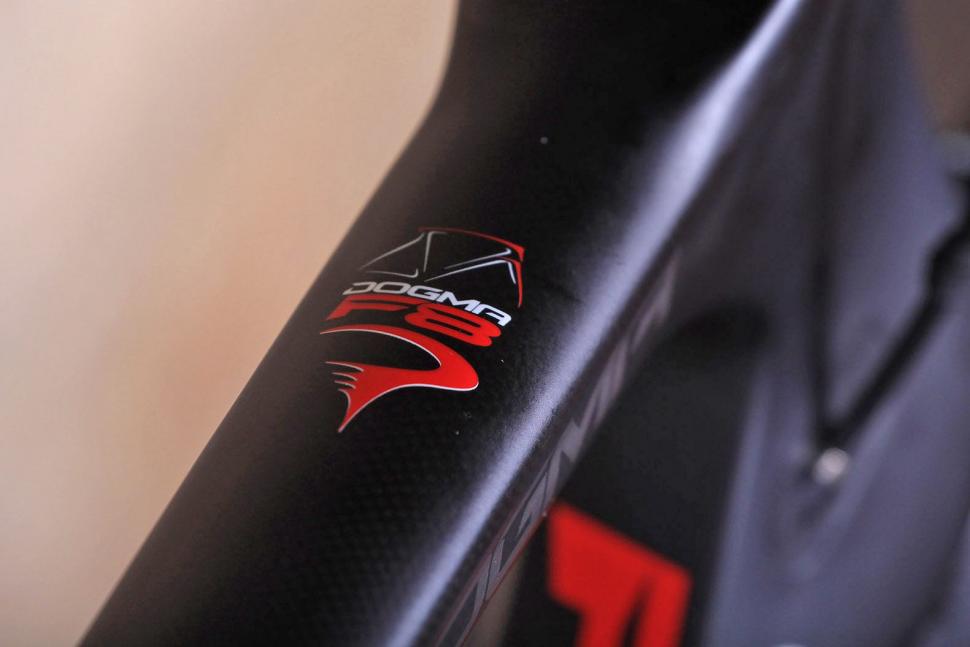
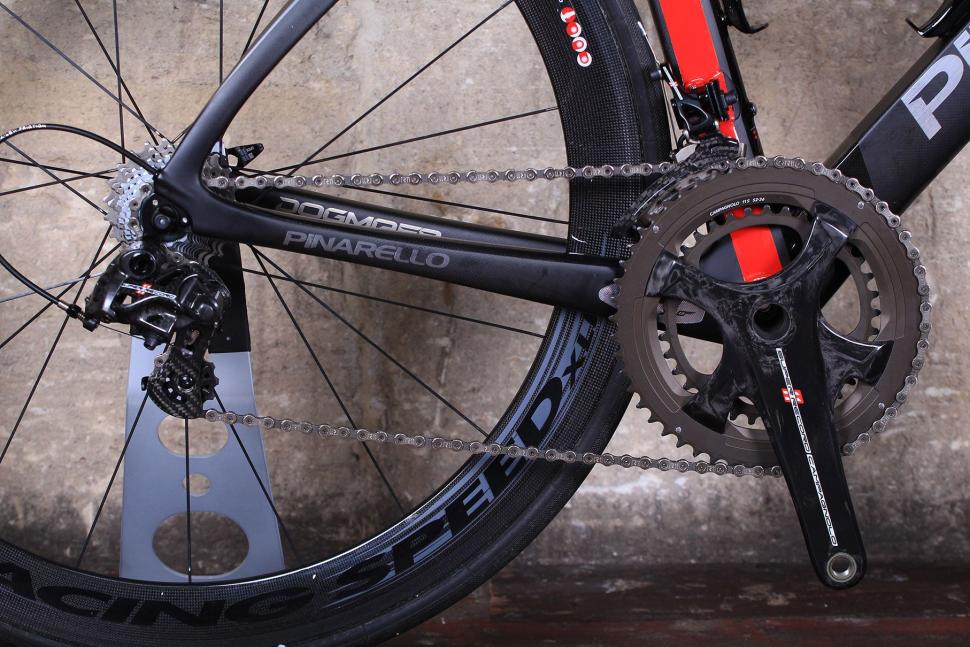
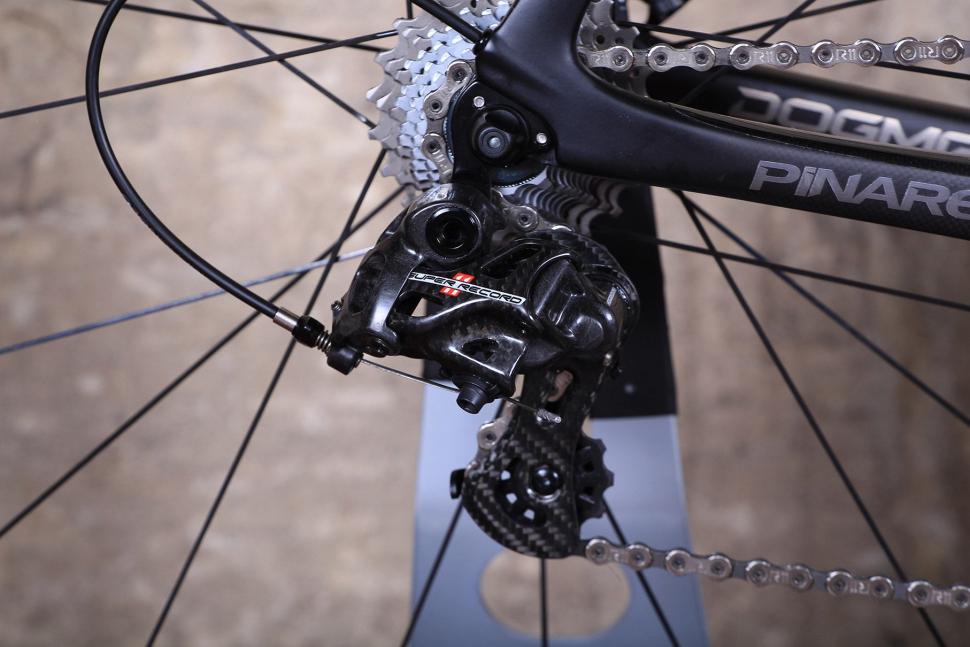
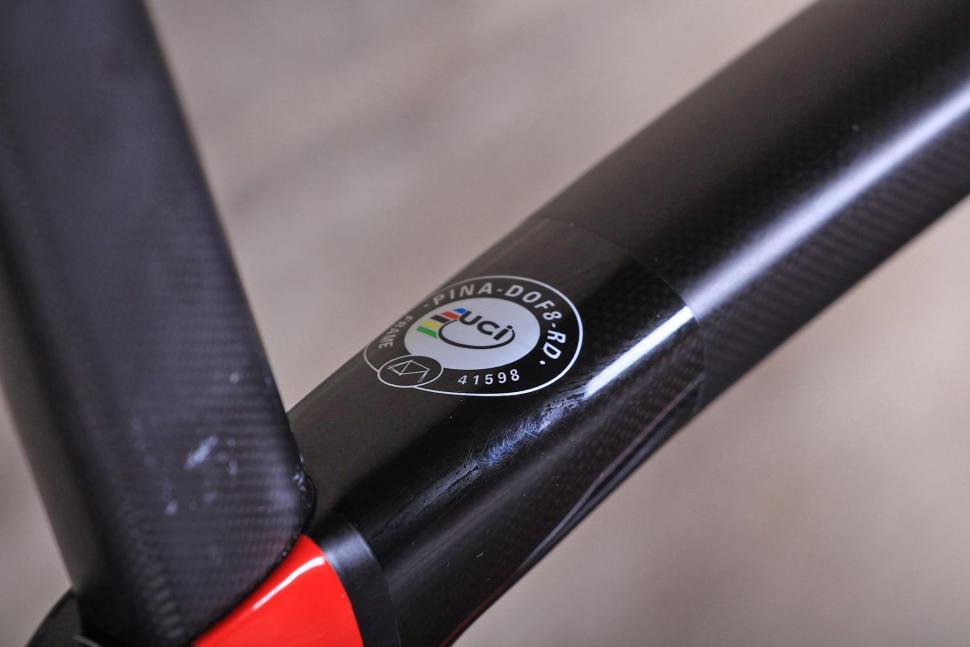
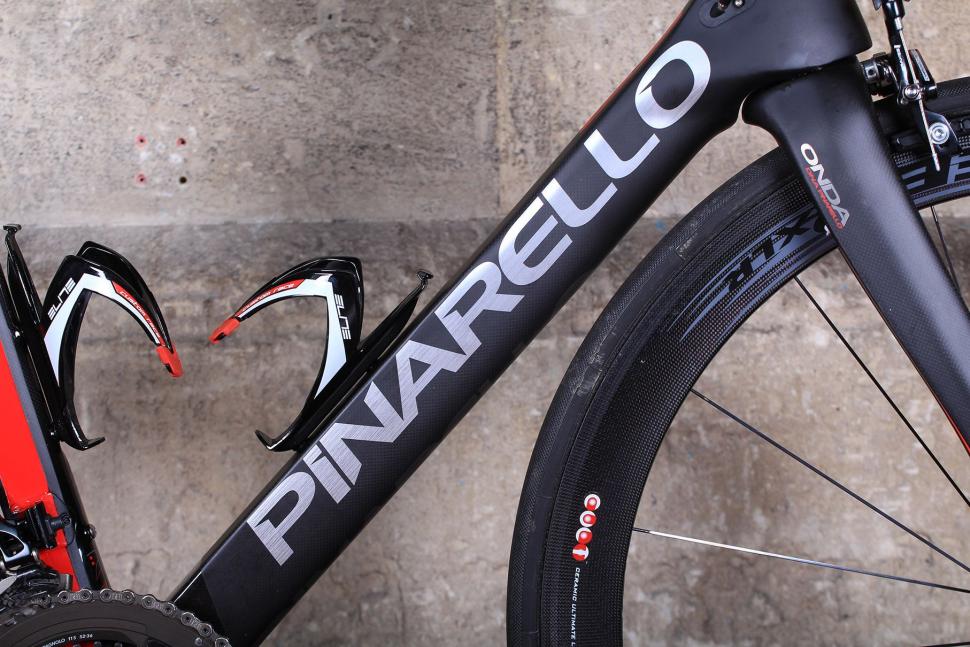
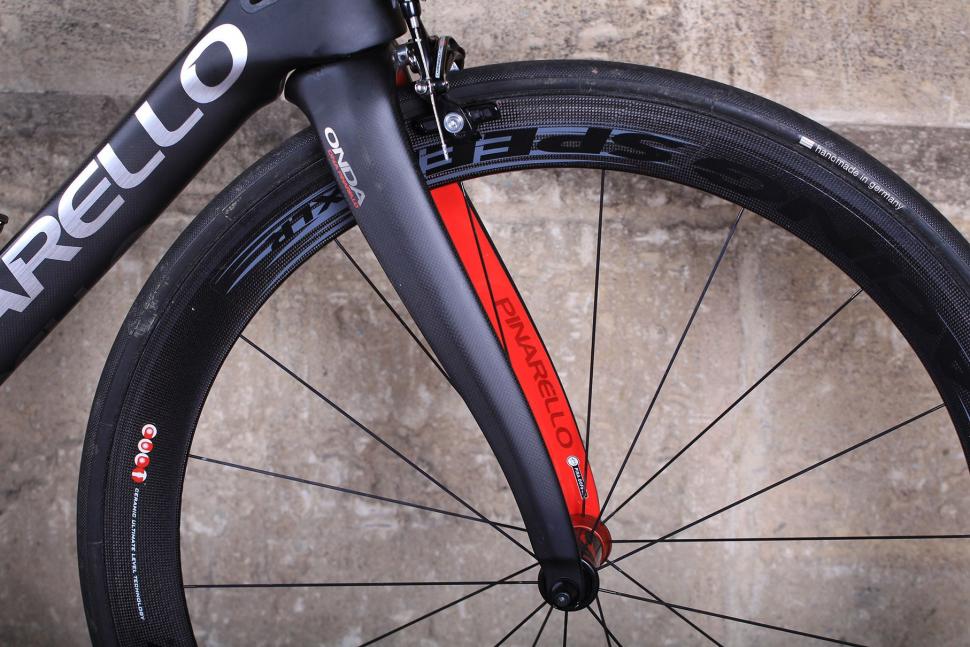

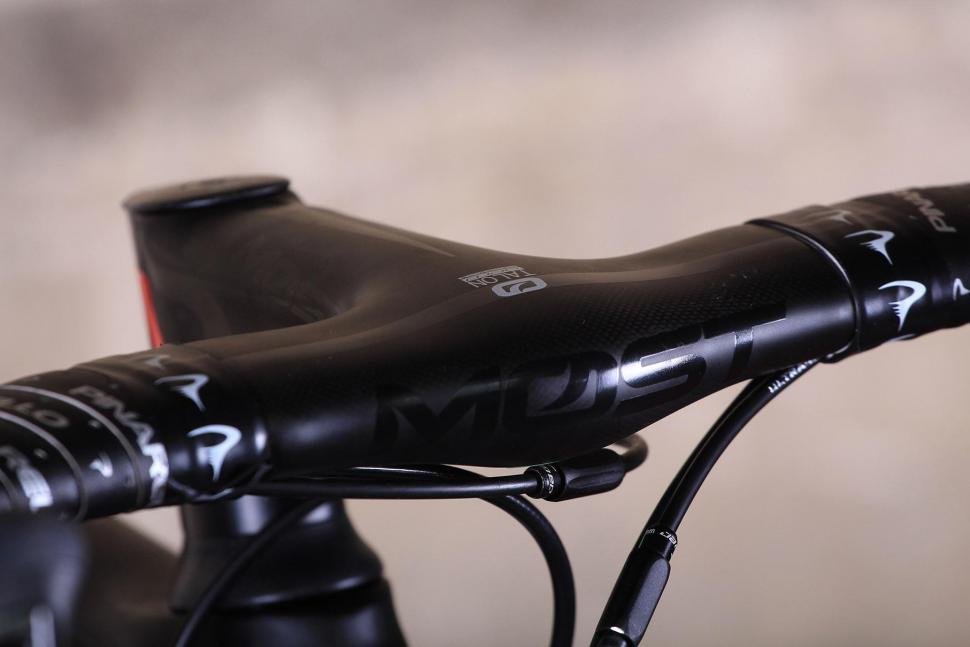
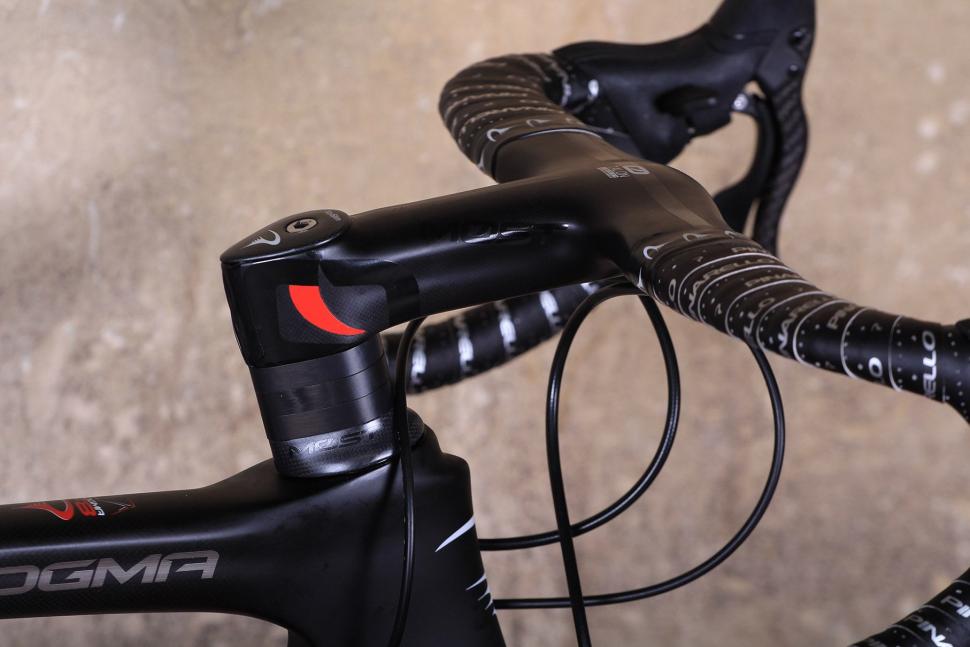

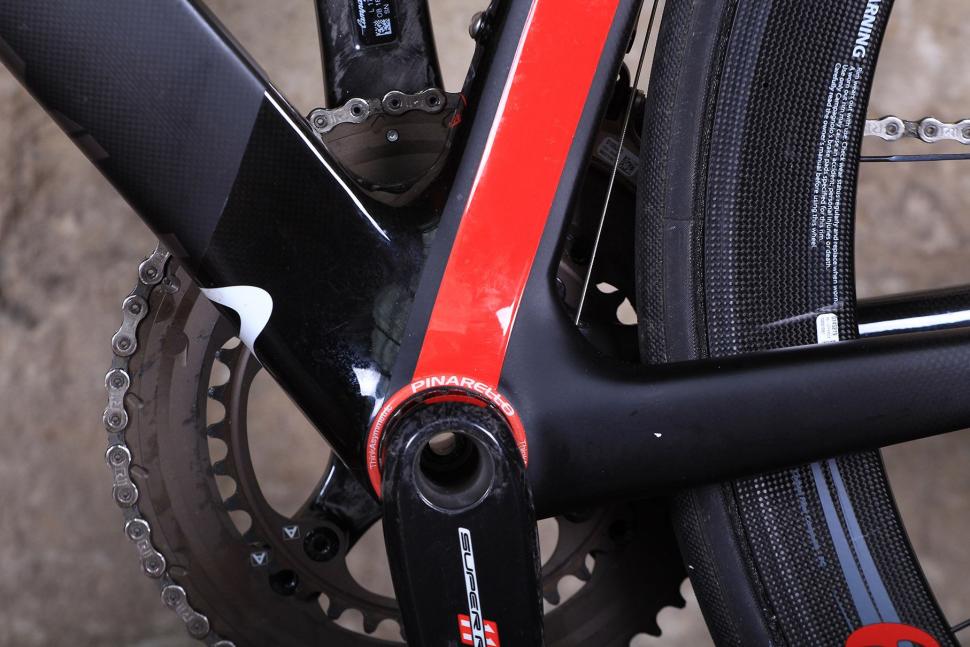
Add new comment
13 comments
£8,250 and you only get a Record cassette!
Penny-pinchers!
May I ask, why two inline cable adjuisters - one on the FD cable I understand, but the other apears to be for the RD, which has a barrel adjuster on the derailluer itself?
Kind of hard to get to that derailleur barrel adjuster when you're riding along though; unless you've got arms like Mr Tickle!
That's the first time I've seen one used on a 2015/16 Chorus/R/SR rear mech. It's not needed. To be honest the front adjuster (which is standard in the box now) isn't needed either as I've been running these latest groups for a while now and the ony time the rear mechs have needed a wee tweek was when I swapped around wheelsets and cassettes.
It must really suck to be a road.cc reviewer
All that money and there's no chain catcher fitted.
Superfluous on a well set up Campagnolo groupset
Better safe than sorry though!
Absolutely - it's superfluous on any well setup groupset apart from when the chain comes off.
Apparently, Pinarello's decision is driven by Sky's request couple of years ago - based on mechanic's feedback. In my mind, this definitely defeats the "press-fit bottom brackets are so much stiffer" argument, because it's perfectly clear Dogma isn't made out of noodles.
In conclusion, there's not one good reason why threaded BB shouldn't be on top end frames. But wait...that means buying less additional tools, less bearings, less servicing costs out of fear that you'll mess it up, for the brave ones less frames (due to messing up the BB area). I wonder who profits out of that decision. Ah yes, us consumers!
Go go threaded BB! Die press-fits, DIE!
I've been surprised to see threaded BBs on a couple of top-end bikes recently, I wonder if they're making a comeback?
Not before time press fit is Sh**te. Im fecking sick of having to buy new tools to keep up with bikes I get in to work on...Oh they are turning up a bit mor and will buy the tool for the BB whatever and use it once every six months.....Bast**rds why change what works, I vote stay threded........????